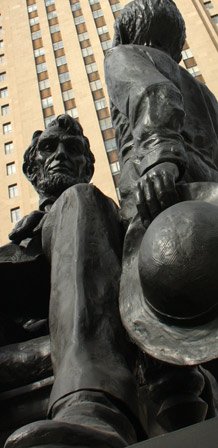The Ash Center for Democratic Governance and Innovation at the John F. Kennedy School of Government, Harvard University, recognized yesterday two Kansas City initiatives named Semifinalists in this year’s Innovations in American Government Awards competition. The Community Improvement District (CID) Revolving Loan Fund, an initiative of the City, as well as the Women’s Empowerment (WE) Initiative, a project of Mayor Sly James’ office, will be among the 100 Semifinalists vying to earn a spot as Finalists, and for the chance to be awarded the $100,000 grand prize in Cambridge this spring.
The WE Initiative and CID Revolving Loan Fund advanced from a pool of more than 500 applications from all 50 states and were selected by the Innovations Award evaluators as examples of novel and effective actions whose work has had significant impact, and which they believe can be replicated across the country and the world.
The Women’s Empowerment (WE) Initiative, the first of its kind in the nation, is a collaboration between the Mayor’s Office, Central Exchange, the Women’s Foundation, and the University of Missouri– Kansas City’s Women’s Center. The overall goals are to ensure the City of Kansas City, Missouri is an inclusive, diverse organization and supportive of women-owned businesses and female entrepreneurs. A blueprint for data-driven, research-based action items was unveiled in March 2014.
In the two years since its founding, WE has impacted the Kansas City community through strategies that make local government a conduit for women’s success. These include the Appointments Project, a public-private partnership that has increased women’s participation in municipal boards and commissions to over 41% through 20 new appointments; expanded professional development and leadership opportunities for City staff; support for women-owned businesses and startups through a contribution to the WE Lend microloan program; and the City’s first-ever paid parental leave policy, which grants City employees six weeks of paid leave at the birth or adoption of a child.
Of the almost 200 Zip+4 zones in Kansas City, 98 were considered economically distressed in 2011 when the city began its Community Improvement District (CID) Revolving Loan Fund. Enabling citizens to take action, the fund partners with a neighborhood providing resources and support to make changes that fundamentally alter its landscape for the better. Instead of relying on outsiders to make improvements in a neighborhood, the CID Revolving Loan Fund provides committed citizens with the means to take action. This approach enables the city to provide essential resources, while focusing on opportunities neighborhood leaders can identify and solve.
A simple concept, once a CID is formed, those organizations within it repay the fund, in turn making resources available for additional investment. As part of this effort, the city created a variety of tools to assist organizations in the formation of their CIDs and managing expenses throughout the project work.
The “Independence Avenue Community Improvement District” became the first CID on March 21, 2013, providing necessary improvements like security and services. In addition the CID addressed general maintenance of public areas, beautification related issues, as well as additional concerns within the Independence Avenue corridor. This CID successfully led “crime and grime” maintenance and landscaping projects, hosted neighborhood pride activities, and supported the construction of community centers.
“These programs demonstrate that there are no prerequisites for doing the good work of governing” said Stephen Goldsmith, director of the Innovations in American Government Program at the Ash Center, “small towns and massive cities, huge federal agencies and local school districts, large budgets or no budgets at all — what makes government work best is the drive to do better, and this group proves that drive can be found anywhere.”
The Semifinalist programs represent a cross-section of jurisdictions and policy areas, and embody one of the most diverse and sophisticated groups that have advanced to this stage in the competition’s 30-year history. They were invited to complete a supplementary application last fall, answering in-depth questions about their work, the process of creating and sustaining their programs, and how they believe they can teach others to do what they do. The Ash Center expects to announce 10 programs as Finalists. Finalists will be invited to Cambridge to present to the Innovation Awards Program’s National Selection Committee in March, with the grand prize winners to be named in June.
Please visit the Government Innovators Network at http://innovations.harvard.edu for the full list of Semifinalists, and for more information regarding the Innovations in American Government Awards.
For more information, contact:
Daniel Harsha
Associate Director for Communications, Ash Center
The Ash Center for Democratic Governance and Innovation advances excellence in governance and strengthens democratic institutions worldwide. Through its research, education, international programs, and government innovations awards, the Center fosters creative and effective government problem solving and serves as a catalyst for addressing many of the most pressing needs of the world’s citizens. For more information, visit www.ash.harvard.edu.















